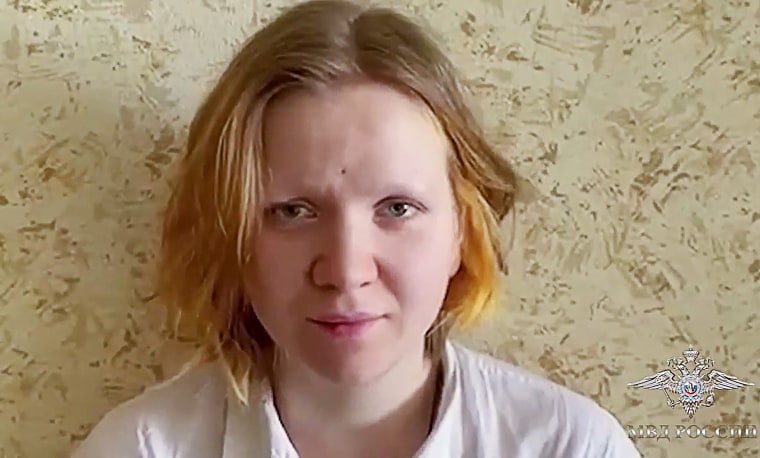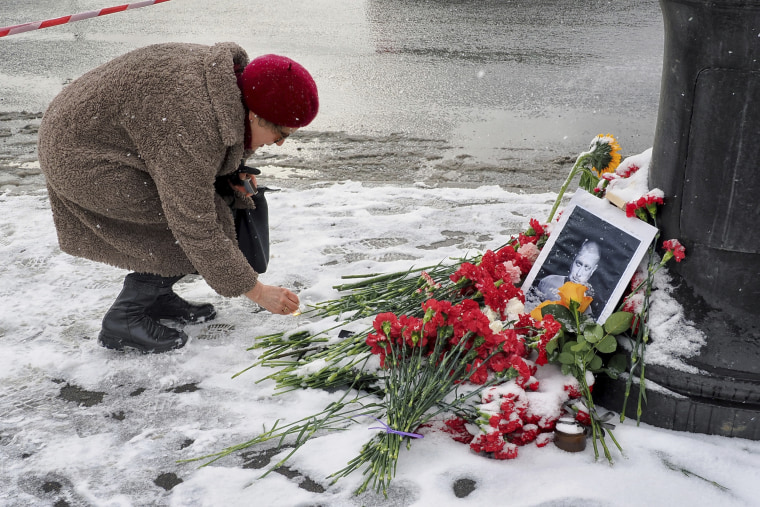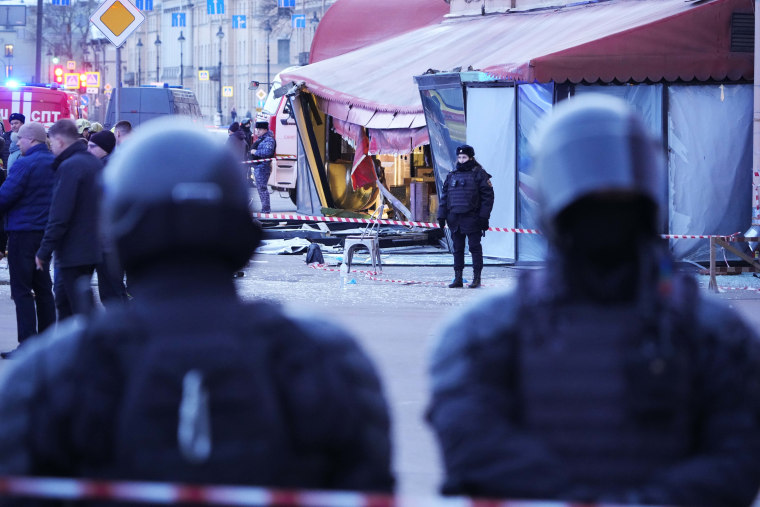Russian authorities said Monday they had arrested a suspect and concluded that Ukraine worked with backers of a jailed opposition leader to carry out the bombing attack that killed one of the country’s most prominent military bloggers.
Vladlen Tatarsky, an outspoken supporter of the war who helped shape the Kremlin’s anti-Ukrainian narrative, was killed in an explosion Sunday night as he held an event at a cafe in the center of St. Petersburg. The blast, which the Kremlin called a "terrorist attack," injured more than 30 people.
The killing of Tatarsky, 40, left Russia’s pro-war establishment shaken and demanding retribution, as authorities moved swiftly to assign blame. Officials in Kyiv and Western military analysts suggested that the incident could have been the result of internal splits.
The Russian Investigative Committee said in a statement early Monday that it had arrested a woman named Daria Trepova, 26, in connection with Tatarsky’s death.

A release from the committee did not share any evidence linking Trepova to the incident or any details about who she is, with the spokesman saying only that investigators were working with her to establish a motive.
Shortly afterward, Russia’s National Anti-Terrorism Committee said Ukraine’s security services were behind the blast. It also accused “agents” working with jailed Kremlin critic Alexei Navalny's anti-corruption organization of being involved.
The counterterrorism agency said Trepova, a St. Petersburg native who had hours earlier been placed on a wanted list, was a supporter of Navalny.
Neither agency provided any evidence of the involvement of Ukraine or Navalny’s backers. Kyiv did not claim responsibility for the incident, hinting that it could have been a case of “domestic terrorism.”
Russian state media reported Sunday that a young woman was alleged to have handed Tatarsky a bust of himself, containing explosives, shortly before the blast.
In a video shared by Russia’s Interior Ministry, an unknown man behind the camera interrogates a woman identified as Trepova. “I brought a figurine that exploded” to the scene, she says. Asked who gave her the figurine, she sighs and asks to share those details later before the video cuts off.
A 'useful' ultranationalist who rose to wartime prominence
Tatarsky’s death dominated the headlines in Russia, highlighting the prominence and near-celebrity status of military bloggers in a country where independent media has been all but eradicated and the Kremlin tightly controls the war narrative.
Tatarsky, whose real name was Maxim Fomin, was born in Ukraine. He gained fame for his reports from the front lines in Ukraine and his analysis of Moscow’s war strategy.
Tatarsky, who was originally from the Donbas region, worked as a coal miner before he started a furniture trade business. When he ran into financial difficulties, he robbed a bank and was sentenced to prison. He fled custody after a Russia-backed separatist rebellion engulfed the Donbas in 2014, joining the separatists and fighting on the front lines before turning to blogging.
He had amassed more than half a million followers on Telegram, a popular messaging app in Russia on which he shared his videos and thoughts.
Tatarsky was often critical of how Russia’s top military brass was handling the war, which he ardently supported. His last post on Telegram criticized Russian forces for not having the same drone munition capabilities as the Ukrainians as Kyiv plans an offensive.
Known for his brash and often expletive-laden language, he appeared at the Kremlin event dedicated to Russia’s illegal annexation of four Ukrainian regions last year. There, he recorded a video saying: “We’ll defeat everybody, kill everybody, rob everybody we need to. It will all be the way we like it.”
Tatarsky's death marks the first high-profile assassination of an ultranationalist military blogger in Russia since the start of the invasion, the Institute of the Study of War, a Washington-based think tank, said in its daily assessment Sunday.
His killing “may reveal further fractures within the Kremlin and its inner circle,” the assessment said. Despite his "deep connections" with the Kremlin and the Wagner mercenary group fighting in eastern Ukraine, Tatarsky does not appear to have been a target “worthy of special attention from Kyiv,” it added.

The blast that killed Tatarsky is reminiscent of another explosion that killed the daughter of a prominent Russian ultranationalist in August. Daria Dugina’s car exploded outside Moscow, and Russian authorities quickly pinned her death on a Ukrainian national, but Kyiv dismissed it.
The killing “draws attention to this new category of aggressive supporters of the war and those who take part in it, who, of course, are not journalists at all, but propagandists,” said Andrei Kolesnikov, an analyst at the Carnegie Endowment for International Peace.
“From the point of view of today’s authorities and propaganda, these are extremely useful people,” he said.
People like Tatarsky have risen to fame only because of the war, Kolesnikov said, and now is their moment to shine and make careers out of it, even though that prominence comes with risk.
Pro-military hawks blame Ukraine and urge revenge
No one has claimed responsibility for Tatarsky’s death.
Russian Foreign Ministry spokesperson Maria Zakhorova quickly pointed the finger at Kyiv, while some pro-war hawks called on Moscow to avenge him and a prominent lawmaker urged vigilance against those "who are ready to kill Russian patriots."
Yevgeny Prigozhin, the influential owner of the Wagner group, said he had owned the cafe where the blast took place and handed it over to a patriotic movement for seminars. He called Tatarsky’s death a “tragedy” but cautioned against blaming Kyiv for it — adding that it was most likely a “group of radicals” not linked to the Ukrainian government.

Mykhailo Podolyak, an adviser to Ukrainian President Volodymyr Zelenskyy, tweeted Sunday suggesting that “domestic terrorism” was to blame. “Spiders are eating each other in a jar,” he added.
Navalny's team also denied any involvement.
Navalny, an ardent Kremlin critic and anti-corruption activist who was poisoned with a nerve agent, is serving a nine-year jail term on fraud charges that he dismisses as politically motivated.
Responding to accusations from Russian authorities Monday, his spokeswoman, Kira Yarmysh, tweeted that the Kremlin could be trying to implicate Navalny in terrorism to keep him in jail and out of politics forever.
It’s hard to seriously speculate who may have wanted Tatarsky dead, Kolesnikov said. “In any case," he added, "the Russian side will come up with ‘the evidence’ proving that Ukrainians did it.”
